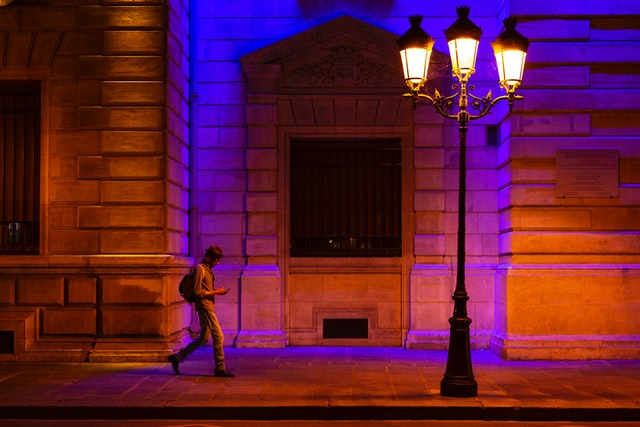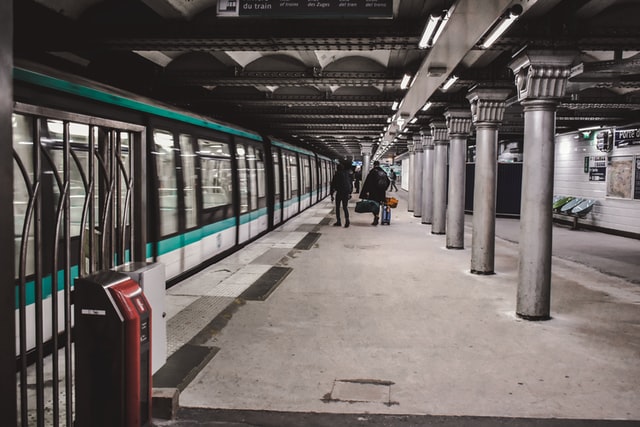Who Can Afford the Curfew?

This pandemic has been hard on everyone’s mental state but one thing that has brought me sanity in times of distress is people watching. From the safety of my small balcony on the 6th floor of my building I have silently studied the city's inhabitants. I find an immense serenity in watching people living their day to day lives and as COVID regulations increased, I found myself rushing to my balcony around curfew watching as the relaxed mood that defines the Parisian flaneur, transformed into a time of stress and fear. Anyone walking home around curfew time can feel the mood change in the city. People are no longer walking reflectively, they are pacing fast trying to get home, parents are rushing with their children inciting them to run or carrying them, and there are more people on electrical scooters and bikes than any other time during the day. But what about after curfew?
I asked myself that question multiple times. Who’s shadows do I see at night carefully wandering the streets of Paris, sneaking off to a forbidden event or going to work in the darkness of the night? Who are the people who defy the curfew and why do they choose to do so? When I first started asking myself why people defied curfew I thought of it in terms of economical positions. Instead of asking myself why people defied curfew I asked myself who could afford curfew. I sincerely thought that only the reason some people defied the curfew is because they can afford it. But boy was I wrong. I am sure that the threat of a hefty fine has been a good incentive for students to stay at home. But for many it is not enough to stop them from sneaking out at night in the streets of Paris. In order to understand why students specifically defy the curfew I interviewed 10 students from AUP. The discoveries I made through those interviews were very different from what I had been expecting to hear.
Walking alone at night in Paris. Image Credit: Nicola Fioravanti on UnsplashI was shocked that most of my interviewees' defiance of the curfew, had nothing to do with the economic threat of a fine. In fact, out of all 10 of my interviewees, just a single one mentioned staying at home because a 135 euro fine was more money than she could afford to part with. In fact, for most, there was a feeling of frustration at the length of the situation. As one interviewee explained, “I have been good, I have followed all the rules and restrictions since last March but now enough is enough. I just can’t stay alone away from my friends anymore. I just don’t care about the rules anymore.” Most of my interviewees expressed similar thoughts, saying that they had decided to prioritize their own social and mental wellbeing instead of following the curfew.
For a few interviewees there was a spirit of resistance involved. For example, three of my interviewees made it explicit that they refused to take orders from a racist government and police force. For these people, defying the curfew was an act of resistance, a protest towards a racist institution. In fact, race was a common theme throughout my 10 interviews, and for one interviewee, "the threat of racially biased armed police officers is greater than a 135 euro fine." This made me realize that I had been blinded by my own privilege by assuming that an economical deterrence was what kept people in doors.
Image Credit: Florian Olivo on UnsplashFor others, their race did not deter their action but contrastingly allowed them to defy curfew without the treat of a fine. For those people, their position of white privilege gave them a “get out of jail free card". For example, one of the interviewees said that she was not worried about the police or the fine because she had already been caught twice and gotten away without a fine. As she explained, “French police officers don’t want to deal with emotional white Americans. All I had to do is cry in English and they just let me go.” And so, a story I thought was going to be about affording curfew on a economical level became a story of who can afford curfew on a racial level.
At the end of the day, there is no way of knowing if the mysterious people walking in the shadows of Paris in the middle of the night are going to work, taking a small illegal walk, or going home from a party. But what I do know is that being able to walk at night past curfew without fearing the police or the threat of a devastating fine is a privilege.



